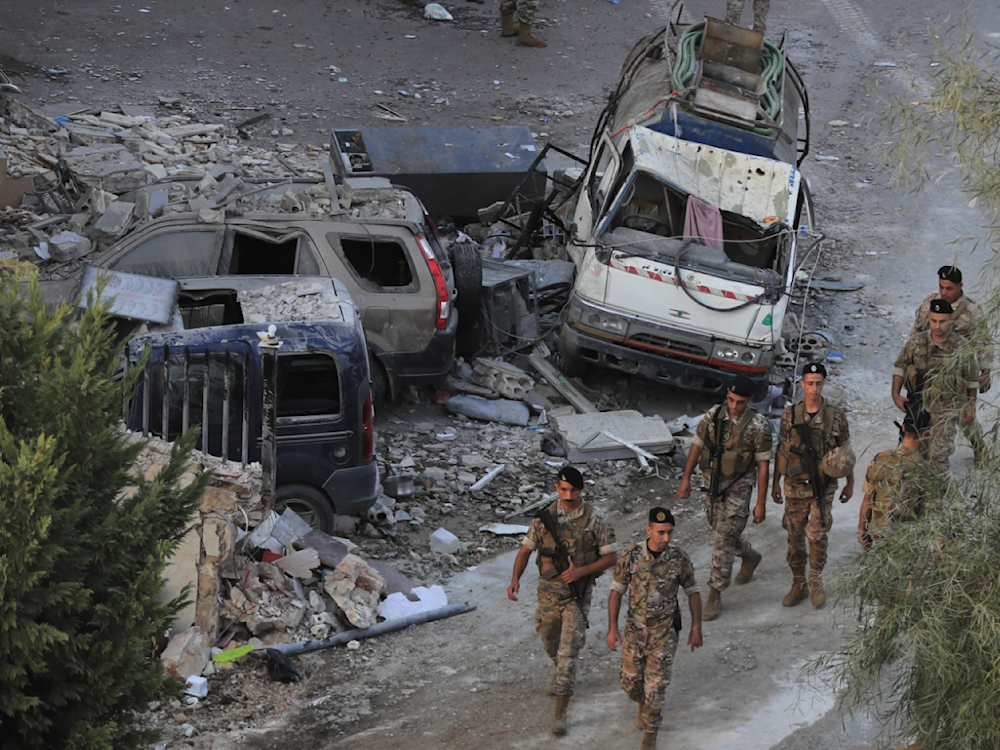Leaks unveil suspicions of 'Israel' using white phosphorus against UN
The report features images showing the tanks rolling through the gates, damaged perimeter walls, and white smoke lingering in the air.
-

Lebanese army soldiers walk by destroyed cars at the site where an Israeli strike hit a building in Barja village in the south of Beirut, Lebanon on October 12, 2024. (AP)
A confidential report has surfaced detailing a dozen recent incidents in which Israeli occupation forces (IOF) attacked international troops in Lebanon, forcing their way into a clearly marked UN base, in addition to suspicions of using the incendiary chemical white phosphorus close enough to injure 15 peacekeepers.
The paper, created by a contributing nation and seen by the Financial Times, highlights how IOF have repeatedly attacked UNIFIL, the UN-mandated force positioned along the de facto border. They have destroyed multiple installations and injured troops stationed at border stations in South Lebanon, something UNIFIL has called "flagrant violations of international law."
In one of the latest acts of aggression against the UNIFIL, Israeli tanks made an incursion into one of the peacekeepers' positions after having fired at them earlier in the week and used them as human shields against the Islamic Resistance in Lebanon.
UNIFIL has publicly disclosed most of the incidents detailed in the confidential report, providing additional information and photographs that illustrate the damage to bunkers housing troops, perimeter walls, and observation towers at various bases.
The report has photos of a direct hit on an observation tower where peacekeepers in the southern town of Kfar Kila saw an Israeli army tank "firing at their watchtower," according to UNIFIL, adding that "two cameras were destroyed, and the tower was damaged" in what the force described as "direct and apparently deliberate fire on a UNIFIL position."
The report states that this bombardment occurred after the IOF had conducted drone surveillance and destroyed the position’s cameras the day before. Photographs included in the report depict a large mound of debris beneath a hole in the corner of a building.
In the early hours of October 13, UNIFIL reported that two IOF Merkava tanks breached the main gate of one of its bases and left 45 minutes after UNIFIL protested. However, within an hour, multiple rounds were fired about 100 meters north of the base, releasing “smoke of suspected white phosphorus” that drifted into the compound, injuring 15 peacekeepers.
The report features images showing the tanks rolling through the gates, damaged perimeter walls, and white smoke lingering in the air.
The IOF acknowledged that one of its tanks had backed “several meters” into the UNIFIL post, claiming it was trying to evacuate injured soldiers under fire. The IOF also alleged that a smoke screen had been deployed for cover.
A UNIFIL source noted that those tanks “can withstand fire better than our position can. So if they were sheltering, it wasn’t for physical shelter."
Rights groups have documented "Israel’s" use of white phosphorus in Lebanon over the past year. Under international law, its use in populated areas is unlawful, but it is often employed as a military tactic to obscure or flush out opposing forces, according to Richard Weir, a senior conflict and arms researcher at Human Rights Watch.
Israeli forces deliberately targeted UNIFIL bases: Official
"The Israeli Army's targeting of UNIFIL forces was deliberate, unlike what Israeli officials are saying," UNIFIL spokesperson in Lebanon Andrea Tenenti confirmed on Friday, stressing that "Israel" targeted the forces several times, five of which were intentional.
According to Tenenti, the watchtower in Naqoura was directly targeted, resulting in the injury of two peacekeeping forces. The IOF also targeted the communication systems and cameras and entered one of UNIFIL's locations a few days ago, staying there for 45 minutes.
All of these incidents were deliberate, Tenenti added, emphasizing that not only do they violate resolution 1701, but international law as well.
In a press conference of UN journalists in Geneva, the spokesperson revealed that peacekeeping forces are forced to stay in shelters for long durations due to the violent bombing.
"The Israeli side requested that we move from some positions along the Blue Line. We have about 29 sites very close to the Blue Line, within a distance of 5 km, but we decided not to move because it is important for the United Nations flag to remain raised there. We are at these locations at the request of the Security Council and the international community," he said.
He further stressed that UNIFIL needs to remain in Lebanon, and "the morale of the peacekeeping forces is still very high."
“We believe that we are here for a reason and like any other military unit we try to lift each other’s spirits,” @UNIFIL_ peacekeeper in southern #Lebanon says, reflecting on the challenges posed by ongoing hostilities in the region
— UN News (@UN_News_Centre) October 17, 2024
Related story ⤵️https://t.co/qlqzOBIhIx pic.twitter.com/nNcnZEVCxB
On another note, Tenenti described the situation of Lebanese residents in southern Lebanon as "extremely tragic". He noted that about 450,000 people have migrated to the north, most of the villages along the Blue Line have been completely destroyed, and severe damage has brought ruin to entire southern villages.
He emphasized that delivering aid to these villages has become an urgent matter and a major challenge due to ongoing bombings and airstrikes targeting villages in the south, and "because we often do not receive guarantees against the targeting of aid convoys, which significantly limits our ability to coordinate with humanitarian organizations."

 5 Min Read
5 Min Read








